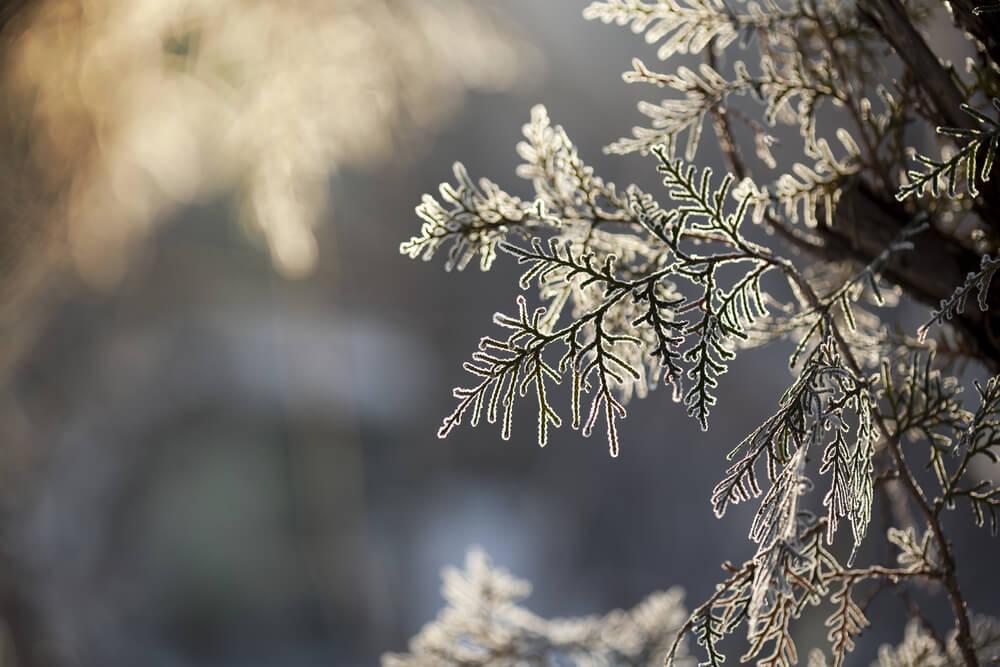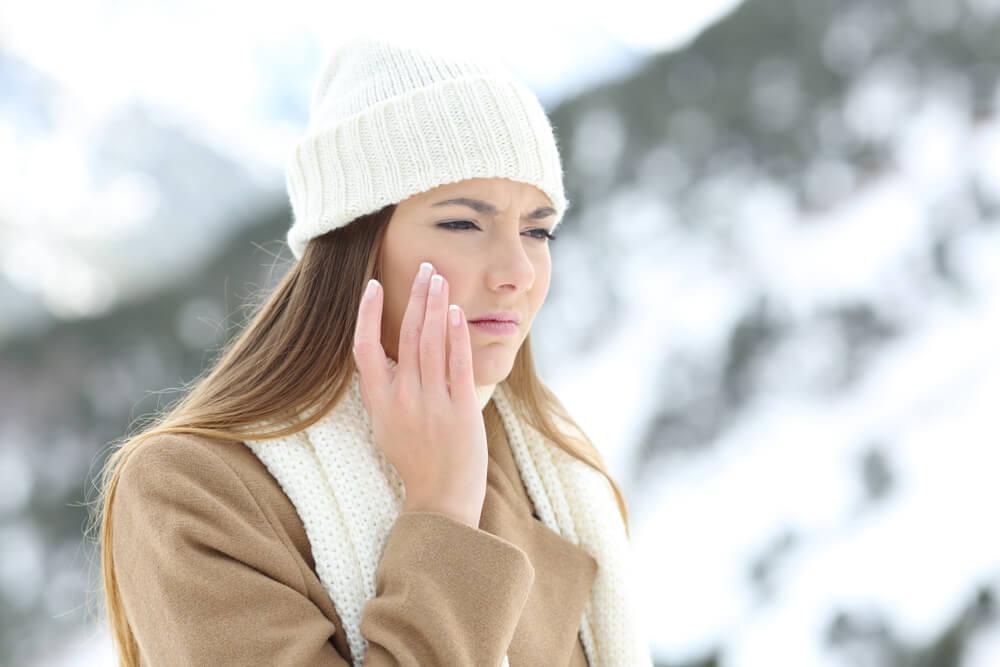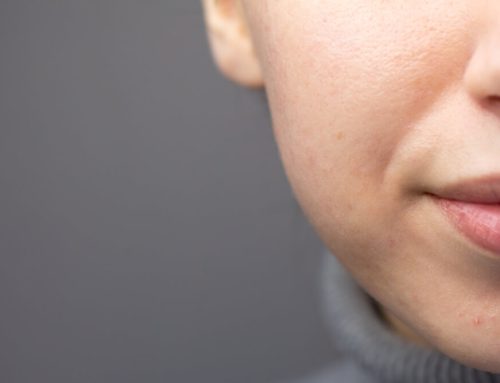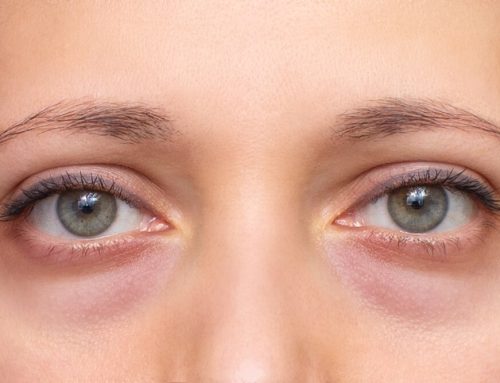Oh, yes, it’s the most wonderful time of the year…
Or is it?
The beautiful snow cover, the snowflakes, Christmas, New Year, and the painful sensation on your skin.
Wait, what?
That’s right. However delightful winter season may be, some problems many of us face come along for the ride. The dry skin and irritation it causes are a threat we encounter in the cold, cold days. Those small cracks in the skin during the winter months can be quite a nuisance, so let’s see what can be done about that, and make your New Year and Christmas a bit better.
What Causes Dry Skin in Winter?

There are a few things that are definitely going to dry out your skin in the winter, but don’t worry, there are also a few ways of dealing with that.
Here are some things that might exacerbate the dryness of your skin.
Cold Weather
It seems a bit random, doesn’t it?
You may wonder, how on earth can a bit of chilly weather and snow cause this? However, the proof is, in fact, in the pudding itself.
Winter air is usually extremely dry, so, dry air equals dry skin.
The dry air causes the upper layers of the skin to lose its natural moisture and, therefore, dry out. The air that comes from heating devices is also extremely dry, so there is no way of escaping it.
Hot Water
Even though many of us know it is wrong to shower with hot water, what can possibly feel better than coming home from a long and tiresome day at work, and a long and cold commute, than taking a dive in a hot, bubbly bath?
Well, as it is, some pleasures do take their toll, and you have to decide whether they are worth it or not.
Having hot showers and baths is actually the wrong way to go, because hot water removes all of the skin’s natural oils which help it remain fresh and elastic. This leads to dry skin, and reduced elasticity of the skin, which, again, leads to those awful, painful cracks.
Hot water is really not recommendable for oily skin. Stripping the skin of its natural oils can actually have a counter effect. It can give a misleading sign to your skin to produce even more oils, which will lead to your skin looking extra shiny.
What Can Be Done?
As we’ve already mentioned, there are a few things you can do to counteract the issues your skin may face with dryness in the wintertime. Here are some of them.
Change Your Shower Routine
In winter time, it is essential to limit your baths to 5 minutes tops. It will not only help your skin preserve its natural oils, but also reduce your electricity bill.
Always, always, always use lukewarm water. It will clean your skin, but not damage it, and it will also help you relax. Lukewarm water is the best for applying and removing any type of skin care products. According to many scientists, many products were tested with this water temperature in mind.
You Are What You Eat

In winter time, more than ever, it is essential to take care of what you eat. By eating healthy, you are boosting your immune response to all sorts of things, viruses, the cold, flu, bacteria etc.
Eating properly can also influence the condition of your skin in the winter time significantly.
You should consume food rich in healthy fats, because these will prove essential in your combat against dry skin. Essential fatty acids like omega-3 preserve the natural barrier between your skin and the outside world. Keeping this barrier intact is extremely important because it retains the moisture on the skin’s surface, not allowing it to get away. Your diet should, therefore, be rich in foods like walnuts, tuna, herring, halibut, salmon and sardines.
Drink Lots of Water
It seems like everywhere you go, everything you read, contains this piece of advice as a solution to all your health issues.
Well, this is not that far from the truth. There is a reason why every single magazine and every single internet blog post emphasizes the intake of water as the first thing you should do to solve all kinds of conditions.
Dry skin is certainly one of them. In order to hydrate your skin you need to drink at least 8 glasses of water a day. It will help your skin get the necessary moisture, as well as speed up your metabolism.
Use a Humidifier
Dry air can be detrimental to the state of your skin, so help it by keeping at least the air inside moist. This can be achieved by buying a good humidifier which will keep the indoor moisture level at the necessary 40 or 50%.
You can always use an alternative, DIY method, and put a wet cloth over the radiator. It will do just as well. Give your skin a chance to recover from the harsh outside conditions.
Keep Exfoliation to a Minimum
Yes, exfoliation is good for removing the dry, dead skin cell from the surface of your skin. However, rubbing a scrub against your dry, sensitive, winter skin isn’t exactly the way to go. By scrubbing the surface layer, you are also removing the moisture and making the irritation worse.
A gentle massage with a scrub or a shower sponge will do. Don’t use those harsh exfoliants like sugar and salt, because they can only make your condition worse at this point. If you are using a chemical exfoliant, beware of glycolic acid.
If you are wondering how much exfoliation is advisable in the winter months, we recommend you exfoliate no more than once a week, although this does also depend on your skin type. This should be enough to remove all the surface residue and still not meddle with the hydration of your skin.
Use a Proper Moisturizer

Many experts recommend petroleum jelly as the most effective product there is for healing the state of your dry and itchy skin. On the other hand, many people are not fond of it because of the look and the feel. It gives you the sense that there is just too much grease on your hands and body. Be that as it may, it is still the number one product for treating sensitive, dry skin.
Another option are products that include water. These products function in a way which binds the water to your skin, making it look extra fresh and smooth. That softening effect is what we are all looking for, but it is crucial to find the one that suits your skin.
It is also advisable to find a moisturizer that contains botanical ingredients such as jojoba oil, coconut oil, safflower oil and linoleic acid. They are very efficient at maintaining the skin’s surface level of keratin which is responsible for keeping the skin supple.
Don’t forget to pick a product that contains SPF and provides you with a proper protection from the sun. Believe it or not, sun can also damage your skin in the winter months, causing it to burn. Did you know that snow reflects the sun rays more than any other surface? That is why your skin is more prone to get sunburned in the winter time, than, for example, in spring. Well, you live and learn.
Another piece of sound advice is to pay attention to all body parts. Your hands and your feet are often easily skipped, but these are the parts of the body that sometimes need the most looking after. The skin on the feet is thicker and, if you don’t pay enough attention to it, you can develop serious problems.
After you apply a thick layer of moisturizer to all parts of your skin, not forgetting your hands and feet, you can put on socks and gloves. The fabric and the warmth inside will help your skin to absorb the moisturizer better.
Avoid Toners
Toners are responsible for soaking all that extra oil you need in the winter months. They are more often used in the summer because they are a good solution for the excessive sweat.
However, in the winter months, every bit of hydration and water on your skin counts, so, for the time being, avoid using a toner, unless it has been specifically designed to hydrate. Your face will be thankful.
Home Remedies for Dry Skin
To be completely honest, sometimes the best solutions to various problems are the ones that are standing there, right in front of you.
At home, you probably have a plethora of everyday products that can help soothe your damaged skin. Let us show you the amazing benefits of products you most likely have at home.
Olive Oil

Known since the time of yore for its innumerable health benefits, it is no wonder it helps with skin conditions as well. It serves as a natural cleanser and moisturizer. It nourishes your skin and helps it restore its former glow.
Just put the oil on your skin, massage it gently in circular motion, so you can help your skin absorb it, and then put a warm, damp cloth over it. After it cools, remove the excess oil.
Olive oil is always a good solution for cleaning and nourishing your skin because it won’t remove the skin’ natural oils.
Coconut Oil
Coconut oil is another thing you have to have at home for several reasons. First and foremost, it can kill different microorganisms because of its antibacterial properties.
It brings almost instant relief to all those suffering from different skin conditions including dry skin. It relieves the pain that cracked skin causes and helps it heal very quickly.
It improves the antioxidant status so it eases any inflammation you might have. It is 100% organic so you needn’t worry whether it is going to have some side effect on your skin. This oil is truly amazing and it should really become a part of your regular winter skin care routine.
Oatmeal Baths
This may seem surprising, but oatmeal, apart from being number one on the list of top healthy breakfast foods, can also do wonders for your skin.
If you put ground oats into the bathwater, you get something called colloidal oatmeal. This mixture puts all the beneficial properties of the oats directly into your skin, making it smoother than ever. It has both anti-inflammatory and antioxidant properties, which help soothe all the skin irritations you are experiencing. It is also rich in Vitamin E, ferulic acid and avenanthramides, which nourish your skin, and make your winter eczema the thing of the past.
Colloidal oatmeal baths solve all kinds of skin problems such as the aforementioned eczema, pruritus, itchy and dry skin.
Among more fascinating effects of the oatmeal bath is the fact that it actually repairs the barrier on your skin which is responsible for preserving the skin’s natural moisture. And that is simply amazing!
Aloe Vera
The healing properties of aloe vera, a cactus-like plant with thick leaves which produce the healing gel, are known throughout the world. There is not a single person on this planet that hasn’t heard of a condition that can’t be treated using aloe vera gel. Dry and itchy winter skin is not an exception.
Aloe vera soothes the skin and helps it repair the cracks that the cold and the dry winter air have caused. Its moisturizing effects have been proven in many studies, which have also come to a conclusion that it can help the general state of the skin, and improve the overall skin hydration.
It can also relieve you from the pain caused by cracked skin. The best way to use it is to apply it on the irritated surface and put a cloth over it before you go to sleep, so it can do its magic overnight.
It is also rich in Vitamins E and C, which are known to be powerful antioxidants. By applying it, you will give your skin the rest it needs, and the results will be visible soon.
It also helps you soothe the lines on your face and body, because of its strong anti-ageing effect.






Leave A Comment